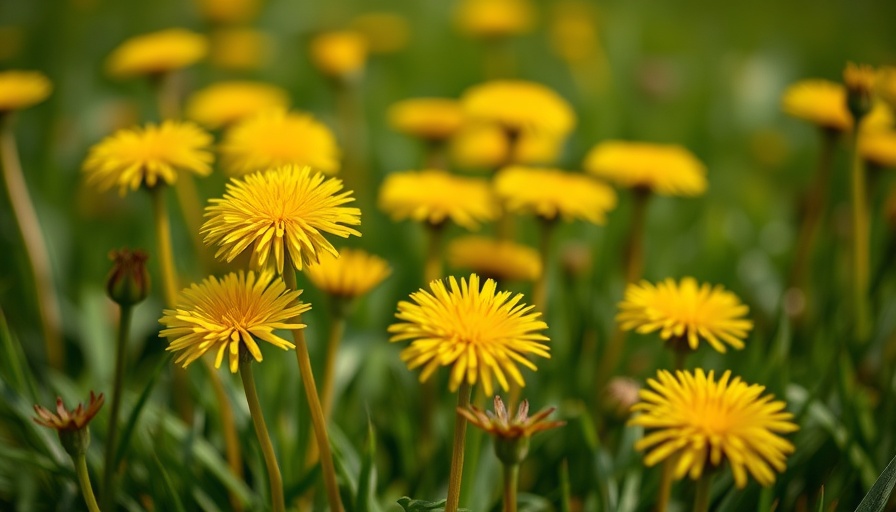
Unseen Remedies in Your Backyard
Many of us view our backyards as mere extensions of our homes, perfectly manicured and designed primarily for aesthetic purposes. However, these green spaces can hold a treasure trove of herbal remedies waiting to be discovered. As the trend toward holistic health continues to rise, more individuals are turning to the plants growing naturally in their gardens or nearby areas. Why rely solely on commercial medications when the Earth provides an abundance of healing at our fingertips?
The Basics of Wildcrafting
Before setting out to harvest herbs, it’s crucial to familiarize yourself with some fundamental principles of responsibly wildcrafting. The first rule is the Rule of Thirds, which suggests that only a third or less of any plant should be harvested at one time. This technique not only sustains the plant's population but also ensures that it can continue to thrive in your environment.
Additionally, the importance of only harvesting what you can use cannot be overstated. Properly planning your harvest means you’re less likely to waste precious resources. Moreover, always ensure you’ve correctly identified the plants you are harvesting—some herbs have poisonous look-a-likes. Engaging an experienced forager or consulting reliable field guides can provide essential insights into safe harvesting.
Popular Backyard Herbs and Their Uses
Among the various plants that frequently show up in residential areas, several stand out for their medicinal properties. Here, we explore a few widely available herbs that can be harvested, offering a range of health benefits.
Plantain: A First Aid in Your Yard
Often dismissed as a weed, plantain is a highly beneficial herb that thrives in compact areas like sidewalks and driveways. The leaves, seeds, and roots all have health benefits. The fresh, crushed leaves can soothe minor cuts, insect bites, and even stings. Additionally, plantain can promote clearer breathing by helping loosen mucus in the respiratory tract.
Moreover, dried plantain leaves are often incorporated into healing salves due to their soothing properties. The versatility of plantain makes it an essential herb for any home herbalist.
Dandelion: The Unassuming Powerhouse
We often view dandelions as the scourge of perfectly kept lawns, but every part of this plant—from the roots to the leaves to the flowers—offers significant health benefits. Young dandelion leaves can be included in salads as a nutrient-rich green, while dandelion tea acts as a natural diuretic, rich in vitamins A, C, and K.
Additionally, the roots of this plant can be used to support liver health, making it an exemplary detox herb. As more people look towards herbal remedies, dandelion proves not just resilient, but remarkably useful as well.
The Significance of Local Harvesting
In Massachusetts, for instance, the beauty of local herbal remedies extends beyond personal health. When you engage with local flora, you forge a deeper connection to the environment. As awareness about sustainability grows, harvesting plants that are naturally available can empower individuals to contribute to the ecosystem rather than exploit it.
By adopting a wildcrafting approach, homeowners can cultivate mindfulness around where their herbal remedies come from, leading to more informed choices about health and wellness. Moreover, teaching children about herbs in their surroundings can instill a love of nature and an appreciation for its gifts.
Future of Herbal Remedies: A Personalized Approach
As we increasingly shift towards alternative and holistic health solutions, understanding herbal remedies opens a wealth of opportunities. The anticipation surrounding natural medicine is growing, and with it, the interest in outdoor activities that can enhance our well-being. Harsh winters in Massachusetts may render backyard gardens dormant, but they also offer time for research and preparation for the upcoming growing season.
Perhaps even more exciting is the potential to connect with your local community through workshops on herbalism, where sharing knowledge about plant identification and preparation can be mutually beneficial.
Start Your Herbal Journey Today!
Before integrating herbs into your routine, consider consulting with healthcare professionals who can provide tailored advice, ensuring your personal health is a priority. Experiment with various herbs, share experiences with neighbors, and revive the art of foraging. Whether you brew up some plantain tea for a sore throat or make a dandelion salad, you might just find that the greatest remedies are closer than you ever thought possible.
Every backyard offers a unique landscape for exploration and healing. So next time you step outside, take a moment to survey your surroundings—who knows what healing plants you might stumble upon?
 Add Row
Add Row  Add
Add 




Write A Comment